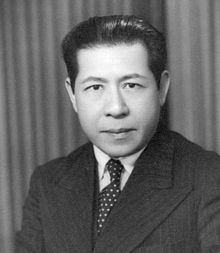Chen Gongbo
Chen Gongbo ( Chinese 陳公博 / 陈公博 , Pinyin Chén Gōngbó , W.-G. Ch'en Kung-po ; born October 19, 1892 in Guangzhou , Chinese Empire , † June 3, 1946 in Suzhou , Republic of China ) was a Chinese politician who succeeded Wang Jingwei as President of the Reorganized Government of the Republic of China , a puppet state that emerged under Japanese occupation , in the final phase of the Second Sino-Japanese War .
Life
Chen Gongbo was born in 1892 to a government official in Guangzhou in the south of the Chinese Empire. As a student at Peking University , he took part in the May Fourth Movement and came into contact with Marxism through Chen Duxiu . Chen Gongbo was one of the founding members of the Chinese Communist Party and attended its founding convention in Shanghai in July 1921. In the following year he left the party again and traveled to the United States where he studied economics at Columbia University , which he finished in 1925 with a master's degree. After returning to China, he joined the Kuomintang , where he became head of the Department for Peasants and Workers under Liao Zhongkai . Within the party, he turned to the socialist and politically left-wing faction around Wang Jingwei, with whom he had an increasing political and personal friendship. He supported Wang's opposition to Chiang Kai-shek 's counter-government in Wuhan . After the end of the northern campaign and Wang's temporary exile, he belonged to a group of Kuomintang politicians who founded the Society for the Reorganization of the Kuomintang to renew the party. Even after merging with other anti-Chiang groups, the company was unable to assert itself and fell apart again. After Wang's return, Chen supported his reconciliation course with Chiang and took over the Ministry of Industry from 1932 to 1936. During this time he supported various economic reforms, the basic system of which was used by various Chinese governments until the 1970s. As party chairman in Sichuan , after the outbreak of the Second Sino-Japanese War, he helped coordinate the relocation of the seat of government from Nanjing to Chongqing .
Chen remained politically in opposition to Chiang, which is why he followed suit some time after Wang Jingwei defected to the Japanese and declared a collaboration regime in Nanjing. Within the collaboration government, Chen first became the spokesman for the Legislative Yuan, Parliament. After nominal control of Shanghai was transferred from the Japanese to the Nanjing government in November 1940, Chen served there as mayor. In March 1944, Wang Jingwei went to Japan for medical treatment. In September of that year, Chen took over from him as President of the Nanjing government on an interim basis. After Wang's death in November, he was proclaimed the new president.
At the end of the Pacific War , Chen fled to Japan. Immediately after the formal surrender of the Japanese troops in China in Nanjing on September 9, 1945, the representative of the Republic of China, He Yingqin , demanded that the representative of the Japanese troops Okamura Yasuji extradite Chen, who was to be charged with high treason. The American occupation authorities in Japan granted the request and brought Chen back to China on October 3rd. During the trial, he defended himself by alleging that during his time as president he refused to cooperate with the Japanese in various important areas and that he defected only out of loyalty to his personal friend Wang Jingwei. At the end of the trial, he was found guilty and sentenced to death, to which he replied that he would soon be reunited with Wang Jingwei in the next world. Chen was shot dead by a police detachment in Suzhou on June 3, 1946 .
Remarks
- ^ T'ien-wei Wu: Contending Political Forces during the War of Resistance. 1992, p. 52.
- ^ Margherita Zanasi: Chen Gongbo and the Construction of a Modern Nation in 1930s China. 2000.
literature
- David P. Barrett and Larry N. Shyu (Eds.): Chinese Collaboration with Japan, 1932-1945. The Limits of Accommodation. Stanford University Press, Stanford 2001, ISBN 978-0-8047-3768-5 .
- John Hunter Boyle: China and Japan at War, 1937-1945. The Politics of Collaboration. Stanford University Press, Stanford 1972, ISBN 0-8047-0800-2 .
- Hsi-sheng Ch'i: Nationalist China at War. Military Defeats and Political Collapse , 1937–1945 :: (= Michigan Studies on China. 16). University of Michigan Press, Ann Arbor 1982, ISBN 0-472-10018-1 .
- Frederick W. Mote: Japanese-Sponsored Governments in China, 1937–1945. An annotated Bibliography. Stanford University Press, Stanford 1954, OCLC 471723503 .
- T'ien-wei Wu: Contending Political Forces during the War of Resistance In: James Chieh Hsiung and Steven I. Levine (Eds.): China's Bitter Victory. The War with Japan, 1937-1945. ME Sharpe, Armonk 1992, ISBN 978-1-56324-246-5 .
- Margherita Zanasi: Chen Gongbo and the Construction of a Modern Nation in 1930s China In: Timothy Brook and Andre Schmid (eds.): Nation Work. Asian Elites and National Identities. University of Michigan Press, Ann Arbor 2000, ISBN 978-0-472-02724-8 .
| personal data | |
|---|---|
| SURNAME | Chen, Gongbo |
| ALTERNATIVE NAMES | 陳公博 (Chinese); 陈公博 (Chinese); Chén Gōngbó (Pinyin Romanization); Ch'en Kung-po (Wade Giles Romanization) |
| BRIEF DESCRIPTION | Chinese politician |
| DATE OF BIRTH | October 19, 1892 |
| PLACE OF BIRTH | Guangzhou , Chinese Empire |
| DATE OF DEATH | June 3, 1946 |
| Place of death | Suzhou , Republic of China |
